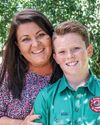
The tricky thing about staying on top of your mental health in a pandemic, and the aftershocks of one, is that it’s perfectly normal to find yourself in emotional states you’ve never been in before. “COVID and the lockdowns that come with that have taken away a lot of the usual ways we deal with stress,” says Dr Vine. “And it’s tough when you can’t have those normal life rituals.” She says that one of the most important things we can do right now for ourselves is to remember that many of us are having normal reactions to abnormal times.
“We are putting pressures on our families and ourselves, so when negative emotions come up, that does not mean you are losing the plot,” says Dr Vine.
Of course, the truth is that sometimes we do stop coping. A recent Australian Red Cross survey nationwide found that two in five Australians say their mental health has been negatively impacted, with a similar number feeling less hopeful about the future. This is perhaps just one of the reasons the federal government’s budget commitment to mental health came in at $2.3 billion. This may sound like a lot, until you hear that the Productivity Commission estimated that mental illness costs the broader Australian economy at least $200 billion each year in healthcare costs, lost productivity, economic participation, career costs, disability and premature death. It pays to keep well.
Here, Dr Vine walks us through how we can better understand our mental health needs, and not miss the signs that we – or those close to us – might need more support.
1. Take the pressure down
This story is from the December 2021 edition of The Australian Women's Weekly.
Start your 7-day Magzter GOLD free trial to access thousands of curated premium stories, and 9,000+ magazines and newspapers.
Already a subscriber ? Sign In
This story is from the December 2021 edition of The Australian Women's Weekly.
Start your 7-day Magzter GOLD free trial to access thousands of curated premium stories, and 9,000+ magazines and newspapers.
Already a subscriber? Sign In

Maggie's kitchen
Maggie Beer's delicious veg patties - perfect for lunch, dinner or a snack - plus a simple nostalgic pudding with fresh passionfruit.

Reclaim your brain
Attention span short? Thoughts foggy? Memory full of gaps? Brigid Moss investigates the latest ways to sharpen your thinking.

The girls from Oz
Melbourne music teacher Judith Curphey challenged the patriarchy when she started Australia's first all-girls choir. Forty years later that bold vision has 6500 members, life-changing programs and a new branch of the sisterhood in Singapore.

One kid can change the world
In 2018, 10-year-old Jack Berne started A Fiver for a Farmer to raise funds for drought relief. He and mum Prue share what happened next.

AFTER THE WAVE
Twenty years ago, the Boxing Day tsunami tore across the Indian Ocean, shredding towns, villages and holiday resorts, and killing hundreds of thousands of people from Indonesia to Africa. Three Australians share their memories of terror, loss and survival with The Weekly.

PATRICIA KARVELAS How childhood tragedy shaped me
Patricia Karvelas hustled hard to chase her dreams, but it wasn't easy. In a deeply personal interview, the ABC host talks about family loss, finding love, battles fought and motherhood.

Ripe for the picking
Buy a kilo or two of fresh Australian apricots because they're at their peak sweetness now and take inspiration from our lush recipe ideas that showcase this divine stone fruit.

Your stars for 2025
The Weekly’s astrologer, Lilith Rocha, reveals what’s in store for your astrological sign in 2025. For your monthly horoscope, turn to page 192.

MEL SCHILLING Cancer made me look at myself differently'
One year on from going public with her bowel cancer diagnosis, Mel Schilling reveals where she's at with her health journey and how it's changed her irrevocably.

Nothing like this Dame Judi
A few weeks before her 90th birthday, the acting legend jumped on a phone call with The Weekly to talk about her extraordinary life – and what’s still to come.